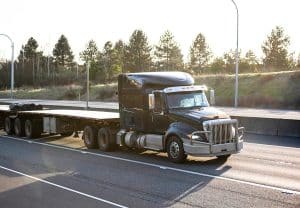Why Empty Trailers and Bobtailing Tractors Are So Dangerous
 North Dakota’s roadways are constantly bustling with a significant number of large trucks. The state’s strategic location and economic activities have made it a prominent passthrough for the transportation of goods. However, an issue that often goes unnoticed is the presence of these trucks on the road, even when they’re not carrying a load.
North Dakota’s roadways are constantly bustling with a significant number of large trucks. The state’s strategic location and economic activities have made it a prominent passthrough for the transportation of goods. However, an issue that often goes unnoticed is the presence of these trucks on the road, even when they’re not carrying a load.
In 2021, 117,300 large trucks were involved in accidents resulting in injuries, and tragically, 5,700 were involved in fatal crashes nationwide. Unfortunately, North Dakota also finds itself among the “deadliest dozen” states for truck accidents, coming in at a number nine. While most truck accidents occur when a driver is hauling cargo, there are risks when drivers are bobtailing or deadheading, too.
What is bobtailing?
Bobtailing refers to the practice of driving a commercial truck’s cab (also known as the tractor) without an attached trailer. This situation typically occurs after a delivery has been made, and the truck is returning to its destination to pick up a new load. When bobtailing, the tractor operates independently, without the additional weight and bulk of a trailer.
Here are a few reasons why driving a tractor without a trailer can lead to accidents:
Difficulty stopping
Ironically, bobtailing increases braking distances. The truck’s braking mechanism primarily relies on the rear wheels, which bear the load when a trailer is attached. When the trailer is disconnected, the driver is more likely to skid out if he or she hits the brakes hard.. This can be especially dangerous on highways or roads with heavy traffic, where sudden stops may be necessary.
Higher speeds
When a truck is bobtailing, the absence of a trailer can lead to a rapid acceleration, significantly increasing speed. Without the trailer’s counterweight, steering and braking become more challenging. This heightened speed can intensify the difficulty of maintaining control, making it a potentially deadly situation on the road.
What is deadheading?
Unlike bobtailing where a truck has no trailer attached at all, deadheading refers to the situation when a truck’s cab is connected to an empty trailer, carrying no cargo. This also tends to happen after a delivery has been made, and the truck is on its way to pick up a new load at another destination.
Like bobtailing, deadheading can lead to its fair share of accidents due to:
Reduced traction
One of the primary concerns is reduced traction and stability. With an empty trailer, the truck’s weight distribution is altered, making it more prone to slipping or sliding, particularly on icy or wet roads—conditions frequently encountered in places like Minot during the winter months.
Increased likelihood of rollovers
Deadheading can raise the risk of a truck rollover. When a trailer is empty, the weight distribution is different, and this can affect the truck’s balance, especially in curves or sudden maneuvers. The imbalance can make the truck more prone to tipping over. This is a critical safety concern not only for others on the road, but also for the drivers of the trucks themselves.
Undesirable weather
Weather conditions, particularly strong winds, can pose additional challenges when hauling an empty trailer during deadheading. The lighter trailer can be more susceptible to wind gusts, making it harder to control the truck and potentially causing it to sway or veer off course.
Drivers’ limited experience
For drivers, operating a truck with an empty trailer is completely different from operating one with a fully loaded trailer. It can be less predictable and more challenging to steer and stop, especially in adverse weather conditions. Drivers who are not accustomed to handling empty trucks may face difficulties, particularly in regions like Minot, where weather conditions can change rapidly. It’s essential for truckers to adequately adapt to these unique challenges, and it can be difficult without proper training or experience.
Risks to truck drivers
Truck drivers face substantial risks when operating trucks with empty trailers or without trailers altogether. Since they become more difficult to drive and are more susceptible to rollovers without cargo, it puts truck drivers at risk of serious injuries and, tragically, even fatalities. The injuries and fatalities resulting from accidents involving trucks can have profound and lasting impacts on the lives of truck drivers. In cases of severe injuries, drivers may experience physical and emotional trauma that can forever alter their well-being. In some unfortunate instances, the injuries can be so debilitating that a truck driver may never regain full physical function, let alone return to the profession they once loved. This loss can lead to not only the inability to continue their chosen career but also the potential loss of income and financial stability.
If you or a loved one were injured in a truck accident, the skilled Minot personal injury attorneys at Larson Law can help. To discuss how we can work to secure you compensation for your accident, call our offices or complete our contact form. We represent all clients injured in accidents, including injured truck drivers. Call our offices or complete our contact form today. We handle accident cases on a contingency fee basis. We have offices in Fargo, Bismarck, and Minot.

Mark Larson is a Certified Civil Trial Specialist and Certified Civil Pre-Trial Specialist focusing on personal injury, car accidents, wrongful death, and oil field claims. Since 1979, Larson Law has served the injured throughout North Dakota. Read more about Mark V. Larson.
